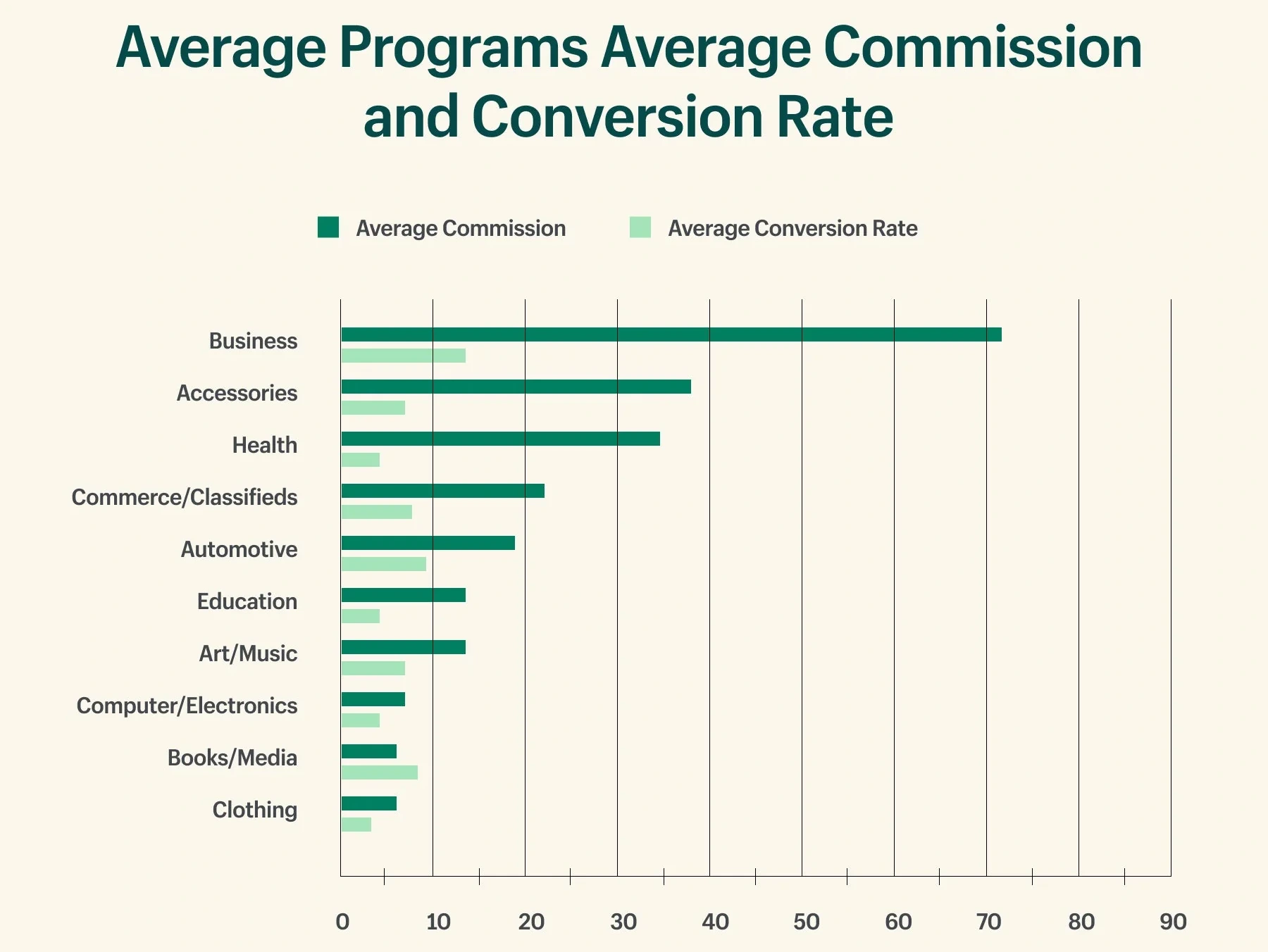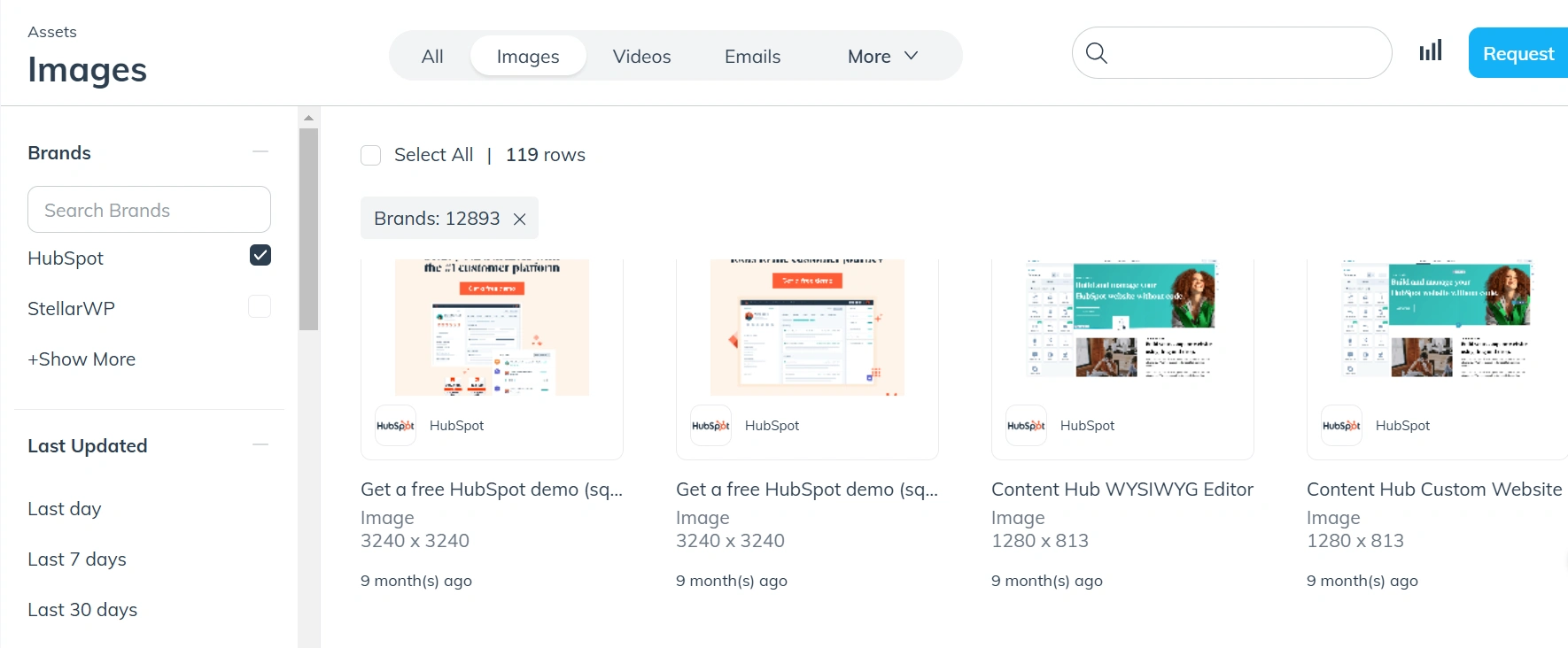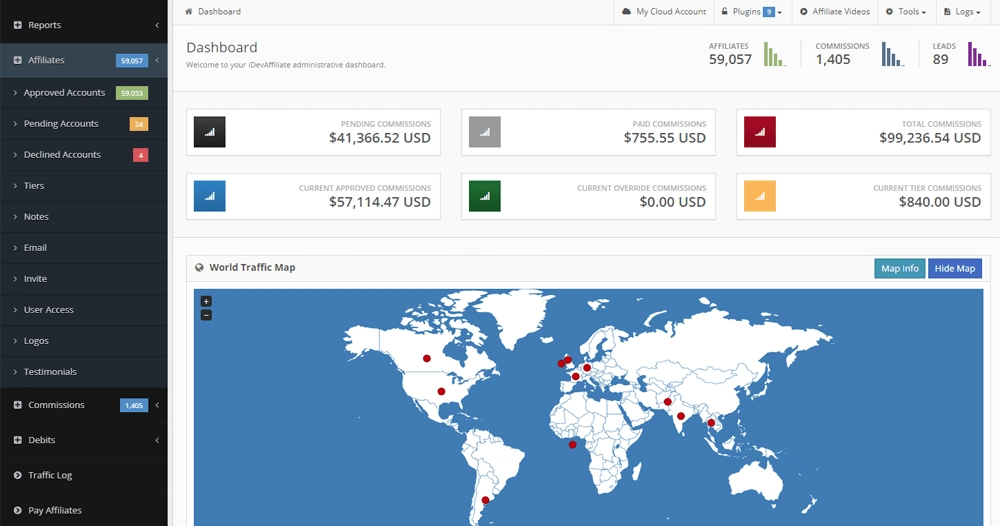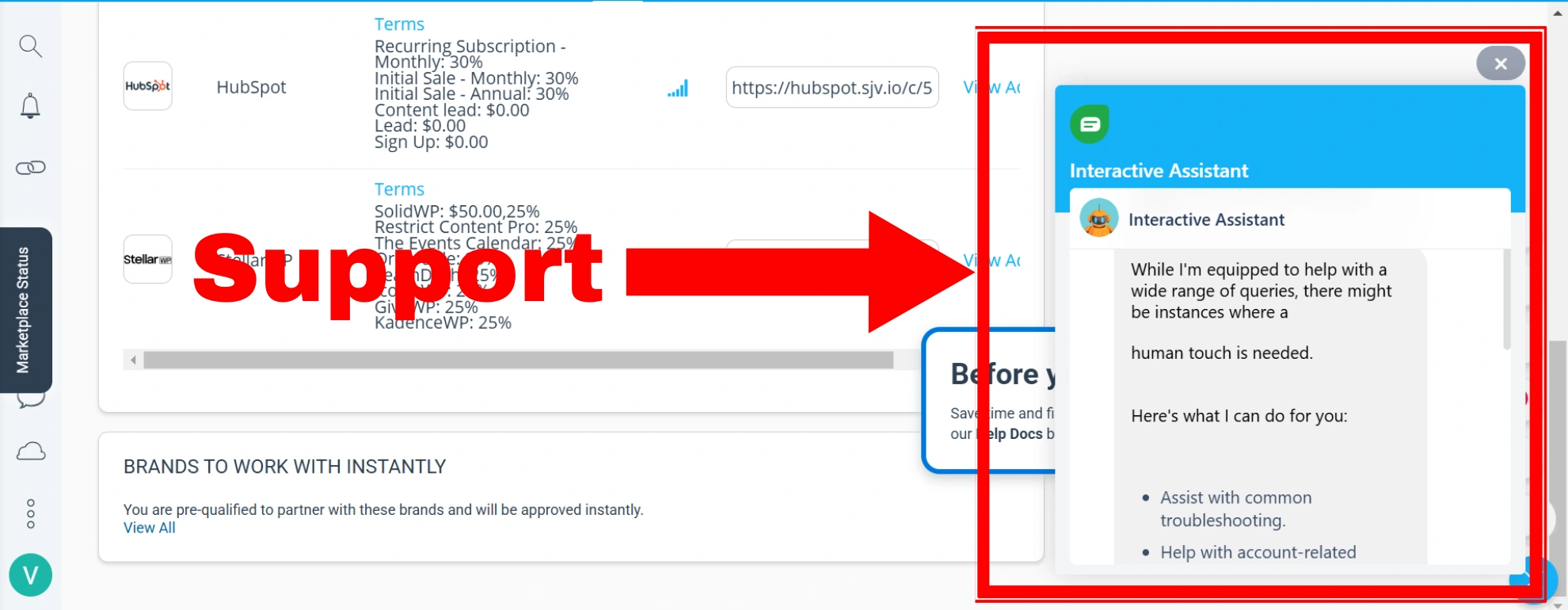8 Main Key Features of a Good Affiliate Program

What makes one affiliate program truly stand out from the rest? In the competitive world of affiliate marketing, it’s not just about signing up for a program that catches your eye. It’s about digging deeper to understand what sets a great program apart and how it can help you succeed.
With more than 80% of businesses relying on affiliate marketing to boost their sales, it’s clear this strategy is a cornerstone of modern business. However, as an affiliate, the program you choose can make or break your efforts.
Think about it, does the program offer fair commissions? Can you trust its tracking system to record every sale you generate? Are there tools and support to help you grow? These aren’t just nice-to-haves; they’re the foundation of a program that’s worth your time and energy.
Whether you’re new to affiliate marketing or have been in the game for a while, understanding what makes a program great is crucial.
In this article, we’ll explore the 7 Main Key Features of a Good Affiliate program, from reliable tracking and payment structures to the quality of products and support.
By the end, you’ll have a clearer picture of what to prioritize, helping you make informed choices and maximize your potential as a digital entrepreneur.
Key Takeaways
- The right affiliate program is essential for effective affiliate marketing.
- Quick response times from affiliate managers can significantly enhance partnership success.
- Aligning audience demographics boosts conversion rates dramatically.
- Effective tracking systems are pivotal for performance measurement and revenue.
- Payment options and support services are critical features to consider.
Understanding Affiliate Programs
Affiliate programs are key in digital marketing. They are partnerships where businesses pay affiliates for bringing in traffic or sales. This way, companies grow their customer base, and affiliates make money from their promotions.
Measuring affiliate program success involves several important metrics. The Click-Through Rate (CTR) shows how many users click on affiliate links. The Conversion Rate, on the other hand, tells us how many of those clicks turn into sales.
Affiliate programs come in different forms, like Pay-per-sale and Pay-per-click. Each one affects how affiliates make money and how businesses grow.
Good marketing partnerships depend on the quality of affiliates. Affiliates help by creating content that speaks to their audience.
Building these relationships takes tools and regular checks on performance. It can take months for affiliates to find their groove and start making money. Long-term strategies are key to lasting success.
Effective management of product costs and fair commission payouts is essential to maintain a healthy affiliate ecosystem.
Why Choose Affiliate Marketing?
Affiliate marketing is a great way for digital entrepreneurs to make more money. It’s easy to start and doesn’t require a lot of money. You can promote products without having to store them, making it a flexible way to earn online.
The affiliate marketing market is growing fast, with a 7.7% growth rate from 2023 to 2030. This means there are more chances for brands and marketers to work together and make money.
Also, 81% of brands see affiliate marketing as a key way to get more traffic and sales. It helps businesses track their spending and see real results, making it more cost-effective.
Working with well-known brands can also boost your credibility. This can help you reach more people in your target audience. Affiliates often see a return on investment of 100% or more, thanks to their trust in their audience.
In short, affiliate marketing is a way to earn money without a lot of work. It lets you make money while you’re doing other things, giving you the freedom to work from anywhere.
Strategies That Good Affiliate Programs Should Follow:
To succeed in affiliate marketing, it’s key to know what makes a program stand out. Good programs have quick management, match their products with the right audience, and check for leaks in traffic. These elements can greatly improve how well a program does.
Responsive Management
Good affiliate program management means being quick to respond. Fast answers to questions help build strong partnerships. Programs that communicate well can see a 60% boost in response times, making everyone happier and more efficient.
Quick support leads to more people getting involved and buying things. This is crucial for success in affiliate marketing.
Audience Demographic Match
Matching products with the right audience is very important. Programs that match well with their audience tend to do much better. In fact, those in a specific niche can see up to a 25% better conversion rate than those selling general products.
Knowing your audience well means you can market more effectively. This leads to more sales and money for both brands and affiliates.
Check for Traffic Leaks
Finding and fixing traffic leaks is key to keeping revenue safe in affiliate programs. Regular checks of the affiliate journey can spot problems that might cost commissions.
Programs that watch for these leaks can make sure they get all the money they should, helping everyone involved financially.
This careful management is a big part of running a successful affiliate program.
In summary, a good affiliate program needs to manage responses well, target the right audience, and watch for traffic leaks. By focusing on these, programs can make more money and keep everyone happy.
Main Key Features of a Good Affiliate Program
Choosing the right affiliate program isn’t just about liking a brand; it’s about identifying the key features that ensure the program is effective, rewarding, and aligned with your goals as an affiliate.
1. Commission Structure: Why It’s the Heart of a Great Affiliate Program
Let’s be real here; how affiliates get paid is one of the most important things in any affiliate program. It’s what keeps people motivated and engaged. And when done right, a solid commission structure doesn’t just benefit affiliates; it helps the business grow too.
There are a couple of ways commissions work. The most common ones are pay-per-sale, where you earn a percentage of every sale you generate, and pay-per-lead, where you get paid for sending potential customers to the business. Depending on the industry and performance, commission rates can range anywhere from 5% to 30%.

Some programs take it up a notch with tiered commission systems. These are like levels you can climb:
- Sell $1,000 worth of products, and you earn 5%.
- Hit $5,000, and that might jump to 10%.
- Reach $10,000, and now you’re earning 15%.
It’s simple: sell more, earn more. Let’s say you’re promoting a $10,000 product with a 5% commission. That’s an easy $500 in your pocket. As you sell more, these tiered systems can seriously ramp up your earnings, and it gives you a reason to push harder.
But a great commission plan doesn’t stop there. Bonuses and incentives are the cherry on top. For example, during a holiday sale, you might get an extra $50 for every sale you make. Little things like that can increase sales by 15%-25%. And if the program offers recurring commissions (say for a subscription service), you keep earning as long as the customer stays on board.
The best programs also keep things fresh. Around 60% of businesses regularly review and tweak their commission structures to stay competitive. It’s not just about paying affiliates; it’s about finding what works and improving. These small changes can result in a 10%-20% revenue boost, keeping everyone (affiliates and brands) happy.
In the end, a great commission plan is more than just numbers. It’s a strategy to keep affiliates excited and invested while driving the business forward. When affiliates feel valued and rewarded, they’re more likely to stick around, put in the effort, and succeed. And that’s the win-win every good program should aim for.
Also Read: Top 8 High-Paying Affiliate Programs To Boost Your Income
2. Valuable and Relevant Products or Services
No affiliate program can succeed without products or services that people actually care about. It’s not just about pushing sales; it’s about promoting things that genuinely solve problems or improve lives. When you focus on value and relevance, everything else falls into place.
Understanding What People Really Need
To create something truly valuable, you need to know your audience. What are they struggling with? What are they looking for? By diving into market research and using tools like analytics, you can uncover the real needs of your target audience.
When businesses align their products with customer needs, the results speak for themselves; more trust, more sales, and happier customers. Did you know that nearly 80% of brands have affiliate programs today? That shows just how important it is to offer solutions people want.
Tailored products don’t just sell; they make customers feel understood, which is how you build loyalty.
Staying Innovative and Adding Value
Meeting customer expectations is good, but exceeding them? That’s what sets you apart. Products that bring something fresh or unique to the table are the ones that get noticed.
Take SaaS companies like ActiveCampaign, for example, they’ve nailed this. Not only do they offer high-quality tools, but they also reward affiliates with generous commissions, of up to 30%. On top of that, affiliates can earn as much as $1,350 per referral, which shows how much value their products deliver.
Offering genuine value doesn’t just help affiliates make money but also builds trust. For instance, subscription-based products often come with recurring commissions, giving affiliates a steady income stream.
Programs offering 33%-50% commissions are perfect examples of how businesses can reward affiliates while delivering exceptional value to customers.
Listening and Improving
At the end of the day, great products come from paying attention to your audience. When brands actively listen to feedback and continuously improve their offerings, they create solutions that customers would actually want to stick with. This keeps people coming back for more and makes affiliates proud to promote the brand.
In short, understanding customer needs and focusing on innovation isn’t just good business. It’s how you build trust and create long-term success. When your products or services truly resonate with your audience, everybody wins.
3. Marketing Tools Provided by Programs
When it comes to affiliate marketing, having the right tools isn’t just helpful; it’s a must. A good affiliate program doesn’t leave you scrambling to figure things out. Instead, it hands you the resources you need to promote confidently and succeed.
Why Promotional Materials Matters
Think of this as your marketing toolkit. Things like ready-made banners, email templates, and social media graphics take the pressure off affiliates to create everything from scratch. They’re there to save you time and help you focus on connecting with your audience.

Plus, when the materials are professional and polished, it’s easier to gain trust and convert potential buyers.
Using Data and Automation to Work Smarter
Here’s where the magic of modern tools comes in. The best affiliate programs give you access to real-time insights and analytics. You can see what’s working and what isn’t: whether it’s tracking clicks, conversions, or the performance of specific campaigns. This information allows you to adjust your strategies and get better results.
Automation also plays a big role. Things like automated tracking, reporting, and even payouts save you hours of manual work. No more chasing down commissions or juggling spreadsheets, it’s all streamlined so you can focus on driving results.
Supporting New Affiliates
If you’re new to affiliate marketing, a program with beginner-friendly tools can make all the difference. Imagine having an easy-to-use dashboard and clear training materials that guide you every step of the way.
It’s not just about the tools, it’s about making affiliates feel supported and confident from day one.
At the end of the day, affiliate programs that invest in robust marketing tools aren’t just checking a box. They’re showing they care about your success. When affiliates have the resources to do their job well, everyone benefits; from increased sales to stronger partnerships.
Programs with strong marketing support help affiliates succeed. It’s important for affiliates to choose programs with the right tools and resources.
4. Advanced Tracking Systems
In the world of affiliate marketing, using advanced tracking technology is key. It helps brands keep track of how well they’re doing across different channels. A big 74% of marketers say tracking is key to knowing if a campaign is profitable. Being able to reward affiliates for meeting goals helps brands stay ahead.

There are many platforms with cool features like managing multiple programs and customizing settings. For example, Tapfiliate lets you handle up to five affiliate programs from one account, which is great for growing businesses. With more people using mobile devices, it’s important to have tools that work well on them.
Spending on tracking software can be a lot, with some systems costing over $1,000 a month. But, it’s worth it because businesses see a 20% boost in conversions with good tracking.
So, picking the right tracking system is not just about checking performance. It’s about growing your business.
Picking the right analytics tools is crucial for success in affiliate marketing. The right tracking tech can spot top-performing affiliates. This helps improve strategies smartly and efficiently.
5. Payment Options in Affiliate Programs
When it comes to affiliate marketing, how and when you get paid matters a lot. A payment process that’s smooth and reliable helps build trust and keeps affiliates happy.

The right payment method isn’t just about the transaction itself but also about making affiliates feel valued and ensuring they can easily access their earnings. After all, if affiliates feel secure about their payments, they’re more likely to stick around and continue promoting.
Popular Payment Methods and Their Pros and Cons
Affiliate programs typically offer a few different ways to get paid, and each option has its own advantages and things to keep in mind. Let’s break down some of the most common ones:
- PayPal: This one’s a favorite because it’s quick and works globally. However, it’s important to note that PayPal charges fees is 2.9% plus $0.30 per transaction, which can add up over time.
- Bank Transfers: A classic method. But the catch is that fees can vary depending on the bank, and if you’re working internationally, it may take a bit longer to see the money hit your account.
- Checks: While checks offer a paper trail and transparency, they aren’t the fastest way to get paid. It can take 1 to 2 weeks to receive them, and there are additional costs for printing and mailing, often around $10 to $20 per check.
- Cryptocurrencies: These are growing in popularity for their speed, especially when processing payments globally. But the flip side is the potential volatility; they can fluctuate quickly, making them a bit risky.
The Power of Timely Payments
Getting paid on time and in your preferred method builds trust with affiliates. If you’re working internationally, offering local currency payouts can help avoid extra fees and currency conversion delays.
Again, when you check in with affiliates about how they prefer to get paid, it shows that you care about their experience. This simple act can lead to greater satisfaction and long-term loyalty.
Ultimately, offering flexible and reliable payment options makes affiliates feel valued and empowered, which leads to stronger relationships and more consistent performance from both sides.
Here’s the summary:
| Payment Method | Benefits | Considerations |
|---|---|---|
| PayPal | Fast transactions, global acceptance | Higher fees (2.9% + $0.30 per transaction) |
| Bank Transfers | Trusted method, may have lower fees for large amounts | Can be slow; fees vary by bank |
| Checks | Easy tracking, familiar to many affiliates | Long processing time, mailing costs |
| Cryptocurrency | Instant payments, innovative | Volatile value, less familiarity |
Choosing the right payment methods can enhance the affiliate experience. It gives a competitive edge in the affiliate landscape.
6. Support Services Available for Affiliates
Affiliate marketing can sometimes feel like navigating a maze, especially for those just starting. That’s where strong support services come in. Top-notch affiliate programs don’t just leave affiliates to figure things out on their own. They offer solid support systems that help them understand how the program works, how to market effectively, and how to earn more.

A well-supported affiliate feels more confident, motivated, and connected with the brand they’re promoting. When the right resources are available, affiliates can focus on what they do best hence driving results.
The Support Services That Truly Make a Difference
- Dedicated Account Managers: Having someone who’s always available to answer questions or offer guidance is a game-changer. Account managers who understand your needs and can provide tailored advice make it easier to tackle challenges and stay on track.
- Clear Onboarding Process: A seamless onboarding experience that includes complete tutorials, webinars, and clear steps greatly helps new affiliates get up to speed quickly. They’re not left in the dark wondering what to do next. The more well-prepared they are, the more effective they can be.
- Frequent Updates: The affiliate world moves fast. Programs that keep affiliates updated with industry trends, changes in the program, or tips for better performance show they’re committed to keeping everyone informed and on top of their game.
- 24/7 Customer Support: There’s nothing more frustrating than running into an issue and not having someone to turn to. Programs that offer 24/7 customer support help resolve problems quickly, so affiliates don’t get bogged down by setbacks.
- Access to Data and Analytics: The best affiliate programs give their partners the tools to track their performance. Being able to see which strategies are working (and which aren’t) empowers affiliates to adjust and improve, boosting both their earnings and the program’s success.
Why Support Matters So Much
The affiliate marketing industry is rapidly growing, and with that comes more competition. Great support helps affiliate programs win customers over against other packed competitors. The program demonstrates its commitment to affiliates by showing them they matter as partners above ordinary machine parts.
Affiliates give better performance when they know they have strong program backing because it makes them stay engaged and work harder to support the brand.
Good support does more than solve issues because it develops partnerships that stand the test of time. Good support materials for affiliates create positive results throughout the program.
7. Reporting Capabilities of Affiliate Programs
Effective affiliate reporting is key to knowing how well a program does. Good reporting lets affiliates see how many clicks and sales they get. This helps them understand which strategies work best, so they can do better.
New tech makes reporting easier. For example, PartnerStack’s new tool helps track everything from partner to product performance. It lets affiliates make reports that focus on what they need to see.
Tools that show data in pictures help spot trends fast. This lets affiliates make smart choices. Knowing about clicks, sales, and revenue is key to growing in a tough market.
| Key Performance Indicator | Description | Impact |
|---|---|---|
| Click-Through Rate (CTR) | Percentage of users who click on an affiliate link compared to the total number of viewers. | Higher CTR means better content and more sales. |
| Conversion Rate | Percentage of click-throughs that result in a sale. | Typically, it ranges from 1.5 to 3 times higher than direct marketing efforts. |
| Average Order Value (AOV) | Reflects the average amount spent when customers place orders through affiliate links. | Typically ranges from 1.5 to 3 times higher than direct marketing efforts. |
| Return on Investment (ROI) | Measures the profitability of affiliate marketing efforts versus the costs. | Average ROI from affiliate programs can reach about 300%, with some programs achieving up to 400%. |
With these reports, affiliates can perform much better by adjusting their strategies, which means more sales and growth. Being open with affiliate reporting builds trust and helps everyone work together to get better.
8. Building a Positive Program Reputation
For affiliate marketing to work well reputation becomes the most important asset. Top affiliates join programs and deliver sales results when organizations steadily develop professional relationships. Affiliates show loyalty to programs that offer clear policies and treat their work with respect.
The key to a strong brand partnership is simple: good communication. Affiliates seek clear expectations and trust only brands that communicate truthfully.
What You Can Do to Boost Your Affiliate Program’s Reputation
On-Time Payments and Clear Commission Structures: Your affiliate relationships will break down when payment delays occur and commission rules are hard to follow. Your affiliates see how much you appreciate them through direct commission terms and prompt payment release.
Consistent Support and Resources: Affiliates require solid support from their partners. Your affiliates will double their commitment to your brand when you supply them with the desired resources and fast answers to their needs.
Feedback Loops: Seeking feedback helps you make real improvements in your business. Seeing your affiliate team’s feedback create real changes strengthens their confidence in your business.
Effective Tracking Systems: When you show all your business facts people develop faith in you. Affiliates must see precise records of their sales results. Reliable tracking systems help everyone understand their performance and stop potential problems.
Examples of Brands Doing It Right
Both Amazon and REI have developed perfect affiliate systems that earn consumer trust. Amazon affiliate program provides affiliate commissions ranging from 1% to 4.5% depending on what items are sold and REI gives 5% commissions along with extended tracking duration. This program draws affiliate interest through its open practices plus reasonable payment methods and partner appreciation.
Why Reputation Matters
An organization earns greater success through proven honesty combined with reliable and clear practices.
Affiliates perform better when they trust the affiliate program they join. When you build trust with affiliates you develop lasting partnerships which drive improved results for your entire business network. Your business grows when you respect your affiliates as key partners.
Conclusion
Achieving success in affiliate programs starts with understanding key features. These features drive effective partnerships. Successful affiliate marketing mixes good management, strong tracking, and a wide range of marketing tools.
Choosing programs with good commission rates, from 4% to 10%, helps digital entrepreneurs grow. Over 80% of brands use affiliate marketing to increase sales and visibility. This shows its big impact on the market.
Strategic affiliate marketing boosts outreach and opens new revenue paths. Programs like Fiverr’s offer strong support and many promotional tools. This lets partners create marketing plans that fit their audience’s needs.
The affiliate model is attractive because it doesn’t require upfront costs. It only pays out when sales are made. This makes it a good choice for businesses wanting to make the most of their marketing budget.
Success in affiliate marketing depends on picking the right partnerships and working hard to keep them strong. By understanding how affiliate program features meet market needs, you can achieve not just profit but also lasting success in the affiliate world.
Frequently Asked Questions
What are affiliate programs?
Affiliate programs are partnerships where businesses reward affiliates for bringing in traffic or sales. This is done through unique referral links. It’s a win-win situation, helping businesses grow while affiliates earn commissions.
What main key features should I look for in a good affiliate program?
Look for a good commission structure and responsive management. Quality marketing tools and advanced tracking systems are also key. You should also find programs with various payment options, comprehensive support, and strong reporting capabilities.
How do commission structures work in affiliate programs?
Commission structures show how affiliates make money. They can earn through Pay Per Sale (PPS) or Pay Per Lead (PPL). It’s important to look at both the rate and stability of these structures for steady income.
Why is an advanced tracking system important for affiliate marketing?
Advanced tracking systems help track performance accurately. They ensure commissions are tracked correctly. This gives valuable insights and helps affiliates improve their strategies.
What marketing tools are typically provided by affiliate programs?
Programs offer banners, links, and email templates for promotion. These tools help affiliates create engaging content. This boosts their chances of successful conversions.









